Marchés
Lors de la conception d’une intervention humanitaire et de la prise de décisions quant à l’utilisation des transferts monétaires, l’analyse générale des options de réponse doit inclure une analyse de marché. Il est prouvé qu’offrir un soutien ciblant le fonctionnement des marchés accélère la reprise et accroît la résilience dans les zones affectées par une catastrophe.
De nombreuses organisations ont investi dans la mise au point d’outils visant à faciliter l’analyse de marché et réfléchissent à la mise en place de programmes basés sur les marchés plus holistiques. Elles envisagent des interventions tirant profit du marché (basées notamment sur des transferts monétaires aux populations affectées), ainsi que des interventions soutenant directement les marchés (comme l’octroi de subventions conditionnelles aux vendeurs/euses pour la remise en condition du marché).
Initiatives associées
Contenu associé

1.2 Introduction à l’analyse de marché
Cours
Ce cours de 30 minutes offre une introduction à l’analyse de marché pour les contextes d’urgence. Il contient des contributions d'experts dans ce domaine. Ce cours a été développé en collaboration avec l'International Rescue Committee et le CALP Network et grâce au financement d’USAID/OFDA et de l’Agence Suisse pour le Développement et la Coopération. Il est destiné aux...

2.4 Un guide pratique pour l’analyse de marché
Cours
Ce cours en ligne de 3.5 heures vise à fournir aux équipes qui conduiront des analyses de marchés en contextes humanitaires une compréhension approfondie de la théorie et des étapes à suivre afin de leur permettre de comprendre le pourquoi et le comment du processus à suivre. Les participants seront guides à travers un scenario d'analyse de marchés d'urgence. Ce cours s'appuie sur...
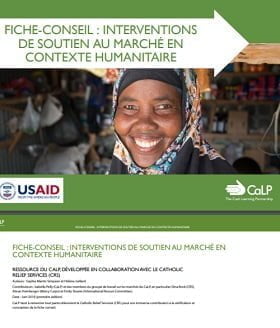
Fiche-Conseil : Interventions de soutien au marché en contexte humanitaire
Guides et outils
La fiche conseil définit le programme de soutien au marché en contexte humanitaire et le décrit dans la pratique. Elle permet aux praticiens humanitaires d’envisager systématiquement des interventions de soutien au marché, parallèlement à d’autres activités du programme. Le champ d’application comprend des interventions de soutien au marché axées sur l’offre/la disponibilité...
Thematic lead
Latest

Shock-Responsive Social Protection Systems Research Case Study: Pakistan
Report
This case study presents an overview of the social protection disaster risk management and humanitarian systems in Pakistan, and discusses both Pakistan’s flagship social protection programme, the Benazir Income Support Programme (BISP), as well as emergency cash transfers provided as disaster...

Learning Event Report: Multipurpose cash and protection for south sudanese refugees in Bidibi refugee settlement Uganda
Report
A consortium of partners comprising DanChurchAid (DCA), Transcultural Psychosocial Organization (TPO) and Mercy Corps (MC) have been implementing an 8-month Cash-based Interventions and Protection (MHPSS) response for South Sudanese refugees in Bidibidi settlement. The response was aimed at addressing...

Cash for Education: A global review of UNHCR programmes in refugee settings
Report
This review provides an overview of the use of cash assistance in 45 cash-related education programmes in 21 UNHCR operations. It highlights the key opportunities and challenges with the use of cash for education and provides key direction for future programming and related protection considerations....

Rapid Market Assessment Sofala Province, Mozambique
Report
The joint TDY between USAID/FFP and FEWS NET Mozambique to Sofala Province, Mozambique had two distinct objectives:
1) Assess current food security and market conditions including:
a) Scale of humanitarian assistance relative to needs
b) Understand maize market structure, conduct and performance
c)...
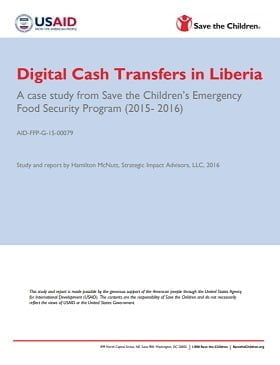
Digital Cash Transfers in Liberia. A case study from Save the Children’s Emergency Food Security Program (2015- 2016)
Report
Through its USAID-funded Emergency Food Security Program, Save the Children was the first organization to implement cash transfers through mobile money at scale in Liberia, where mobile money services are nascent. From liquidity management to incentivizing agents, the challenges, lessons, and...

Multi-sector Market Assessment: Companion Guide and Toolkit
Guidelines and Tools
The Multi-sector Market Assessment: Companion Guide and Toolkit provides step-by-step guidance and ready-to-use tools to enable non-specialist staff to conduct market assessments and undertake market monitoring. The purpose of this Companion Guide and Toolkit is to enable Multi-Functional Teams to...

Feasibility of Multi-purpose Cash Transfers in N’Guigmi
Report
This assessment was conducted by World Vision’s Emergency Program in the Lake Chad Basin. The objective was to: 1) Do a comprehensive needs assessment of the affected populations in the area, 2) Specify the amount of the minimum expenditure basket 3) Evaluate the market capacity and feasibility of...
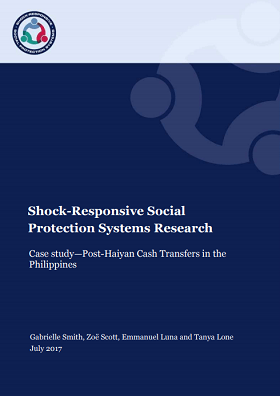
Shock-Responsive Social Protection Systems Research Case study—Post-Haiyan Cash Transfers in the Philippines
Report
This case study report focuses specifically on the experiences of using emergency cash transfers following Typhoon Haiyan and considers the wider social protection system, developments since Haiyan and future possibilities for shock-responsive social protection. A summary briefing note is published...

Baseline Survey for Project Output and Livelihoods Support Assessment
Report
This report highlights the baseline findings of the UNHCR funded project “Increased self-reliance through cash interventions and livelihoods support to conflict-affected South Sudanese refugees in Bidibidi refugee settlement and host communities in Yumbe District in Uganda” implemented by...

Multisectoral Basic Needs and Market Assessment Moyo Uganda
Report
A multisectoral basic needs and market assessment done in Palorinya settlement and the host communities within Moyo district. Focuses are on basic needs and cash feasibility, the education system gaps, the firewood issues and access to loans and credit.
Data were gathered in December 2017, with...

Delivery Mechanism Mapping for Cash Based Interventions in Cox’s Bazaar Bangladesh
Report
The ‘Delivery Mechanism Mapping for Cash Based Interventions (CBI) in Cox’s Bazaar, Bangladesh’ was conducted in December 2017 by a ‘Cash Champion’ deployed from Catholic Relief Services (CRS) with the support of the Global Shelter Cluster and ECHO, and involved consultations with numerous...

The Role of Financial Services in Humanitarian Crises
Guidelines and Tools
More than 75 percent of adults who live in countries that are coping with humanitarian crises remain outside the formal financial system. Financial inclusion would provide both refugees and residents with a diversified set of financial products (including savings, remittances, credit, and insurance) that...

Tracking Expenditure on Cash Transfer Programming
Guidelines and Tools
The need for reliable and comparable data on Cash Transfer Programmes (CTPs), collected systematically and based on standardized markers and definitions, is widely recognised. Improved CTP tracking and reporting is essential for monitoring progress towards the commitments made to strengthen the scale and...
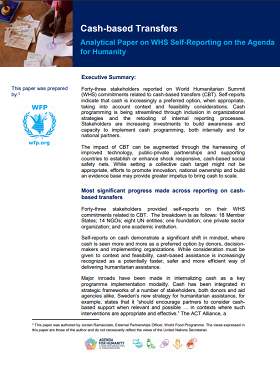
Cash-based transfers. Analytical Paper on WHS Self-Reporting on the Agenda for Humanity
Report
Forty-three stakeholders reported on World Humanitarian Summit (WHS) commitments related to cash-based transfers (CBT). Self-reports indicate that cash is increasingly a preferred option, when appropriate, taking into account context and feasibility considerations. Cash programming is being streamlined...

Building on social protection systems for effective disaster response: the Pakistan experience
Report
How can social protection systems be used in disasters, as a complement to, or substitute for, humanitarian assistance? Oxford Policy Management (OPM) led a two-year research project investigating this question, looking at the role of social protection in both mitigating the impact of large-scale shocks...
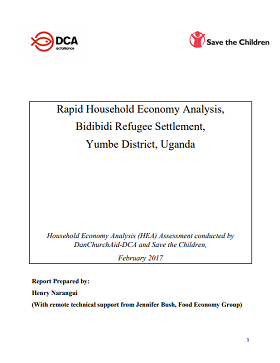
Rapid Household Economy Analysis,Bidibidi Refugee Settlement,Yumbe District, Uganda
Report
Yumbe District (Bidibidi settlement) hosts about 272,2061 refugees from South Sudan. An influx of refugees to Bidibidi settlement, Yumbe District, took place starting from August 2016 due to the increased conflict, scarcity of food, and subsequent financial instability caused by hyperinflation in South...

Can Conditional Cash Transfers improve the uptake of nutrition interventions and household food security? Evidence from Odisha’s Mamata scheme
Report
There is considerable global evidence on the effectiveness of cash transfers in improving health and nutrition outcomes; however, the evidence from South Asia, particularly India, is limited. In the context of India where more than a third of children are undernourished, and where there is considerable...
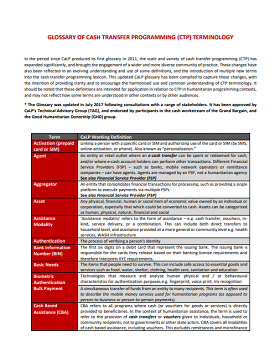
Glossary of Cash Transfer Programming (CTP) Terminology
Report
In the period since the CALP Network produced its first glossary in 2011, the scale and variety of cash transfer programming (CTP) has expanded significantly, and brought the engagement of a wider and more diverse community of practice. These changes have also been reflected in an evolving understanding...

White Paper on Cash Coordination
Report
As more agencies are using cash transfer programming in humanitarian contexts, the need for coordination has grown. Aid organizations have set up cash working groups in many emergency settings that often differ in terms of leadership and institutional setup. This ad hoc approach has helped provide...

Libya Humanitarian Cash Working Group (CWG) Key Messages
Report
The purpose of this document is to provide key messages of the Cash Working Group (CWG) that can be used in discussions with humanitarian stakeholders. This document is not designed to be passed to interlocutors, but rather inform CWG members on key points to raise in discussions.
